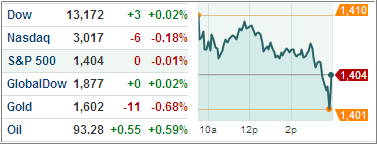Domestic stocks pared better economic-data driven early gains Tuesday in the final trading hour, after media reports suggested Greece was set to seek more time to meet its budget-deficit reduction targets. As if more time would really make a difference.
The Financial Times of London suggested Greece is expected to propose 1.5 percent deficit reduction annually from the present 2.5 percent annual target.
The Dow Jones Industrial Average closed marginally higher while both the S&P 500 and the tech-heavy NASDAQ slipped.
Yields on US Treasury notes rose, pushing prices down as US retail sales for July came in higher-than-estimated, easing demand for safe-haven assets. Retail sales, contributing 70 percent to the GDP, grew for the first time in four months, diluting speculations of further quantitative easing by the Federal Reserve.
On the downside, according to a Bureau for Labor Statistics report, producer prices grew faster at 0.3 percent, topping the projected 0.2 percent growth. Business inventories however, rose by 0.1 percent in June against the 0.2 percent anticipated rise, indicating a steady demand-driven recovery.
The greenback strengthened against the single-currency slightly on the back of better-than-anticipated July consumer spending number as speculations over further QE dampened.
Before that, the euro managed to trade higher after German GDP in Q2 beat the 0.2 percent growth forecast and expanded at an annualized rate of 0.3 percent while France unexpectedly avoided contraction.
The dollar index, a barometer of the USD’s strength against a basket of six leading currencies, rose to 82.540 from Monday’s 82.404.
Despite Germany and France managing to hover on the plus side, eurozone’s GDP shrank 0.2 percent in Q2 after remaining flat in the previous quarter. Portugal and Spain contracted by 1.2 percent and 0.4 percent, respectively.
However, the August German ZEW reading, an index of German investor sentiment, declined unexpectedly to its lowest level since December. European stocks, however, rallied to a near five month high as most indexes reacted positively to the German GDP and US retail sales numbers.
After weeks of floundering, the CBOE Volatility Index bounced back today despite several positive economic reports, vaulting 8.39 percent on the day. The ProShares VIX Short-Term Futures ETF (VIXY) was among the day’s biggest percentage gainers, leaping 5.66 percent for the day. Other volatility-linked funds like the Barclays iPath S&P 500 VIX Short-Term Futures ETN (VXX) also rallied, adding 5.57 percent over Monday.
As July retail sales reading beat estimates, Market Vectors Retail ETF (RTH) climbed 0.56 percent after top holding Home Depot (HD) surged four percent. RTH has a hybrid make-up that combines both consumer discretionary and consumer staple leaders. RTH has significant holding of retail giants like Wal-Mart, Amazon and CVS Caremark.
Bottom line is that volume remains to be atrocious, which very likely will not change until after Labor Day. Of course, unforeseen events, such as a European country openly running into financial difficulties, can quickly reverse current market complacency and pull the indexes off their nothing but QE hope induced levels.
Disclosure: No holdings
Contact Ulli
